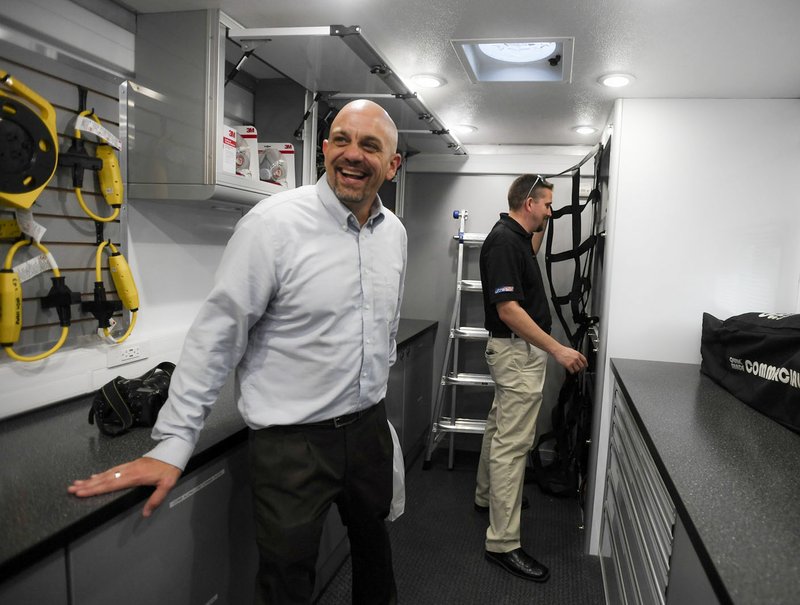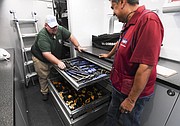BENTONVILLE — Northwest Arkansas Community College’s Mobile Construction Lab will visit schools in the region to build awareness among students about available career opportunities in the industry.
The lab is an outfitted ambulance-shaped vehicle packed with small, medium and large construction tools, safety equipment and a generator to provide electricity.
The college purchased the vehicle with part of a nearly $800,000 state Department of Higher Education grant awarded in 2017. It process of branding the exterior and supplying it with tools and equipment finished over the summer. This is the first year it will be able to travel to schools.
The grant, which was renewed and increased to $1 million this year, has allowed the college to buy a second vehicle for another mobile lab. It should be ready in six months, said Jerod Bradshaw, the college’s director of the construction management program and the career pathways case manager.
One will service Benton County schools and the other Washington County schools, he said.
Bradshaw, who works closely with construction companies and public school career and technical education teachers, will be able to engage with 25 schools in Benton and Washington counties this year because of the grant renewal, he said. That’s an increase from last year’s 22 schools.
The mobile labs will also allow schools to do projects on their campuses or in the community, Bradshaw said.
It also provides schools with resources they may not have, he said.
For example, Bradshaw said the lab carries a welder. “If schools don’t have it and they want their kids to learn how to use it, they can use ours,” he said.
There are plans for the lab to visit Rogers middle and high schools this year, said Dawn Stewart, the district’s career and technical education director.
“It’s not only for career exploration but also those hands-on learning experiences related to construction,” she said.
Bradshaw has been instrumental in building partnerships between schools, the college and construction businesses. It’s allowed for schools to mold curriculum to better fit employers’ needs as well as provide students a head start into job training, Stewart said.
The grant also provides money for teachers and students to receive industry-recognized certifications from agencies such as the Office of Safety and Health Administration and the National Center for Construction Education and Research.
“And it doesn’t cost them anything,” Bradshaw said.
Students are also able to earn college credit while still in high school by taking materials of construction class online or completing the National Center’s core and carpentry level one course, paid for with the grant, officials said.
Students who graduate with the certifications have the equivalent of one year of the required four-year apprenticeship completed, said Cori Miller, project manager with Crossland Construction.
It gives students a head start in the workforce, and it gives employers more knowledgeable and invested apprentices, she said. It also saves the company the cost of paying for the first year of the apprenticeship.
Being certified can increase a student’s hourly pay if they enter a construction trade after high school. Large contractors in the area will often give an extra 50 cents per hour per certification, Miller and Bradshaw said.
Miller said the grant and all it provides is wonderful because it exposes more students about the potential of a career in the construction industry.
“Right now, if you’re a skilled professional in the construction industry, you have your choice on where you want to work,” she said. “Companies are fighting for employees. There’s a huge need for them.”
Employers have been looking to fill an average of 225,000 construction jobs each month through the first quarter of this year, according to the U.S. Bureau of Labor and Statistics.
Ninety-one percent of the 2,700 contractors, construction managers, builders and trade contractors surveyed for the most recent Commercial Construction Index reported having a difficult or moderately difficult time finding skilled workers.
The college’s program one of 20 workforce training programs in the state to receive $13.6 million in grants to help build partnerships between schools and industries. The grants were announced in July.


